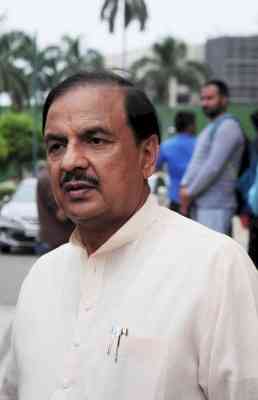Ball will shift to President's court after May 16
New Delhi, May 13 (IANS) With the general election finally over and the results to be out on Friday, the scene will now shift to Rashtrapati Bhavan and its incumbent, President Pranab Mukherjee. The president has been reading up exhaustively...

New Delhi, May 13 (IANS) With the general election finally over and the results to be out on Friday, the scene will now shift to Rashtrapati Bhavan and its incumbent, President Pranab Mukherjee.
The president has been reading up exhaustively on past precedents set by his predecessors, especially when there have not been clear-cut verdicts, meeting constitutional experts and talking to political pundits, including senior journalists, on the various options before the constitutional authority.
"The president met constitutional experts last week. Arrangements will be made only after the election results are out. The process will start once the chief election commissioner presents the list of the new elected MPs to the president," an official in the president's office told IANS.
In case a party or an alliance has a clear majority of 272 in a Lok Sabha of 543 elected members, the president's task is simple: To invite the leader of the majority party/alliance to form a government and, in the case of an alliance, prove his/her majority on the floor of Parliament at the earliest.
Though exit polls have predicted a clear majority for the Narendra Modi-led National Democratic Alliance (NDA), in case there is a hung verdict, the president's role will come into sharp focus as he has to then decide which of the rival groupings has the majority support in the Lok Sabha.
It all depends on which party or alliance first comes forward with the claim to form a government. In 1989, Rajiv Gandhi, leader of the Congress party which was the largest single party but significantly short of a majority with 197 seats, declined to form a government as he said it was his view that the Congress had lost the confidence of the people.
It was left to then president R. Venkataraman to invite V.P. Singh, as the leader of the second largest party but with outside support from the BJP and the Communists, to be invited to form the government and prove his majority on the floor of the Lok Sabha.
Similar situations have happened after other elections as well when the winning formations did not have enough numerical strength and the presidents of the time have exercised their constitutional prerogative and discretion in ensuring the formation of what in his consideration could lead to a stable government.
But even before the confidence vote, as constitutional experts point out, the immediate challenge for the new prime minister will be the election of the new speaker for the 16th Lok Sabha. That itself will be a test of strength of the new government as the ruling party or alliance would naturally like to have their own nominee elected as speaker.
The next test will come when the house debates the president's address and the motion of thanks that has to be passed by voice vote.
If the new government passes these two tests, it will then formally move a confidence resolution that will be debated and then voted upon.
According to political commentator R. Rajgopalan: "Each president had their own style of functioning. But they have to go by the constitution and satisfy themselves that he is nominating the right person for the top post. He, however, cannot go against the public mood."
"From K.R. Narayanan to A.P.J. Abdul Kalam, each had their distinctive style of functioning. Some of them courted controversy also."
According to Harish Salve, a leading constitutional lawyer, if the results are on the lines of the exit polls then the role of the president is clear-cut.
"There is no confusion in that. He will write a formal letter to the leader of the NDA and ask them to send a formal letter to make their position clear. They will of course write back saying that they are happy to form the government.
"In the meanwhile, Prime Minister Manmohan Singh will meet the president and tender his resignation. The president will tell him to stay on till a new government is formed."
Salve said the president will then invite the Bharatiya Janata Party-led NDA to form the government. A date will then be set for the swearing-in ceremony at Rashtrapati Bhavan.
But if there is no clear majority, the president will write to the single largest party and ask them whether they can form the government.
"If they reply and say they are unable to form the government, then he will ask the leader of the second largest party to explore options of forming the government. The president has to exhaust all possible options before he can think of dissolving parliament and call for fresh elections, a nightmarish situation for the country. But this situation has never happened," Salve told IANS.
The term of the present Lok Sabha, the House of People in the Indian Parliament, ends May 31. The date for convening the new Lok Sabha will be decided by the new government.

 cityairnews
cityairnews 













